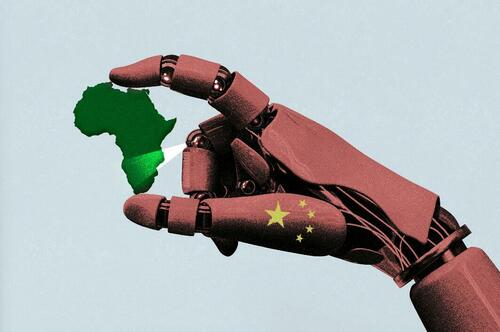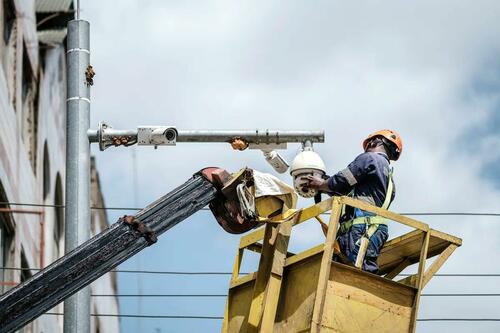
The Rise Of China’s 'Surveillance Colonialism’ In Africa
Authored by Darren Taylor via The Epoch Times (emphasis ours),
JOHANNESBURG—African governments are using Chinese artificial intelligence to find, jail, torture, and even kill political opponents and pro-democracy activists, according to several investigations.
 Illustration by The Epoch Times, Freepik
Illustration by The Epoch Times, FreepikResearchers say Beijing is exporting its “surveillance state” model to African countries and rapidly positioning itself to control the critical infrastructure, data, and energy that will power the continent’s AI systems in the future.
This could mean that China will have immense influence over politics and public life in Africa, potentially influencing election outcomes and swaying public opinion in favor of Beijing and its allies, according to the studies.
Some academics say it’s happening already.
One investigation by a nonprofit studying the use of social media and other technology to target dissident groups worldwide concluded that a “largely invisible pattern” is transforming conflicts across Africa.
The Distributed AI Research Institute (DAIR) stated that using technology such as spyware to hunt political activists and employing facial recognition to track protesters represents “a new kind of mercenary force” in Africa, one that’s largely shaped by companies controlled from Beijing.
Adio-Adet Dinika, researcher and affiliate fellow at the Bremen International Graduate School of Social Science in Germany, headed DAIR’s Data Workers Inquiry project. It investigated incidents in countries including Ethiopia, Rwanda, and Zimbabwe.
Dinika’s research revealed the existence of “digital sweatshops” in African cities and towns, including in Nairobi, Kenya; Accra, Ghana; and Gulu, Uganda, where workers are paid as little as $1.50 per hour to teach AI systems to recognize faces, moderate content, and analyze behavior patterns.
The Chinese regime is perpetrating what Dinika called “digital colonialism at its most insidious.”
“I call this surveillance colonialism, the process by which foreign powers extract data and labor from African populations to build AI systems that ultimately police, repress, and destabilise those very populations,” he wrote.
 A worker cleans a surveillance camera on a street in Nairobi, Kenya, on Jan. 18, 2019. Experts have documented the increased use of Chinese surveillance technology in Africa, enabling police to track and detain protesters. Yasuyoshi Chiba/AFP via Getty Images
A worker cleans a surveillance camera on a street in Nairobi, Kenya, on Jan. 18, 2019. Experts have documented the increased use of Chinese surveillance technology in Africa, enabling police to track and detain protesters. Yasuyoshi Chiba/AFP via Getty ImagesAmong the new additions was CloudWalk, with which “the Zimbabwean government agreed to the installment of a mass surveillance network in Zimbabwe,” the Treasury stated at the time.
“The agreement included a requirement that the Zimbabwean government send images it acquires from the surveillance network back to Cloudwalk’s offices in China, so that Cloudwalk could improve the ability of its facial recognition software to recognize individuals based on skin pigmentation,” the Treasury stated.
The technology that emerged, according to Dinika, is now used by China across Africa and the world, including in public spaces in Zimbabwe frequented by anti-government demonstrators.
Zimbabwe counts itself as one of Beijing’s closest partners.
Zimbabwe President Emmerson Mnangagwa’s spokesperson, Nick Mangwana, told The Epoch Times that Zimbabwe’s “excellent cooperation ties” with the Chinese Communist Party (CCP) and its leader, Xi Jinping, “means Zimbabwe now has one of Africa’s most sophisticated crime-fighting tools.”
An extensive study into Zimbabwe’s use of AI surveillance systems by Germany’s Humboldt University in 2024 concluded that the use of the technology has not resulted in a single public conviction of a criminal.
Zimbabwean pro-democracy activist, Evan Mawarire, told The Epoch Times: “When you are arrested and locked up by the police, they boast how they use their AI technology to identify us at protests. The Chinese tech gear is being used as a form of political control. The police say they can watch us anytime, anywhere, because they have also bought devices from the Chinese to monitor internet and phones.”
In response, Mangwana said he would not comment on the “nature of our security apparatus and how it is employed, because that would make it ineffective.”
He emphasized that Zimbabwe’s security forces use technology “in line with Zimbabwean law.”
 AI security cameras with facial recognition technology are seen at the 14th China International Exhibition on Public Safety and Security at an exhibition center in Beijing on Oct. 24, 2018. Nicolas Asfouri /AFP via Getty Images
AI security cameras with facial recognition technology are seen at the 14th China International Exhibition on Public Safety and Security at an exhibition center in Beijing on Oct. 24, 2018. Nicolas Asfouri /AFP via Getty ImagesCloudWalk and the Chinese Embassy in Zimbabwe declined to comment.
In Ethiopia, the pro-Beijing government is using Chinese “sentiment analysis tools” against the country’s Tigray population, Dinika said.
He said those tools allow the authorities to monitor social media and online posts in real time, while even providing information regarding the tone of communications.
Dinika explained that one of the key AI tools used by the Ethiopian authorities is an AI application called Natural Language Processing.
“By means of this, the system is trained to understand the context and nuances of the Tigray language. It can interpret verbal cues such as sarcasm, and Tigray people have disappeared just on the basis of this,” he said.
When Ethiopian authorities relied on Chinese AI during the 2020–2022 Tigray conflict, they weren’t just buying technology, Dinika said. They were “outsourcing critical governance functions to foreign entities with their own strategic interests.”
During the conflict, the algorithms that determined which social media posts amounted to “ethnic incitement” were trained by data workers in Kenya, his investigation found.
During Kenya’s 2024 Gen Z protests against a proposed tax increase, the country’s top telecom company, Safaricom, “unlawfully” shared customers’ location data with security forces, Dinika’s report alleged.
This allowed the police to track and detain protestors, he said.
Safaricom has denied any level of cooperation with Kenyan authorities.
Dinika said Kenya President William Ruto’s government used “data interception” in combination with facial recognition tools and footage from hundreds of Chinese-supplied CCTV systems to create what he termed a “digital dragnet” that resulted in the “enforced disappearances” of 82 people, with 29 still missing.
Professor Willem Gravett, a senior lecturer in law at the University of Pretoria, has also documented the increased use of Chinese technology in Africa.
Read the rest here..
Tyler Durden
Sat, 07/26/2025 – 07:00
